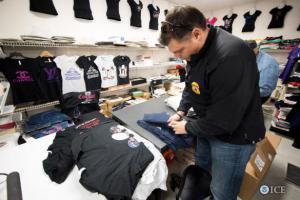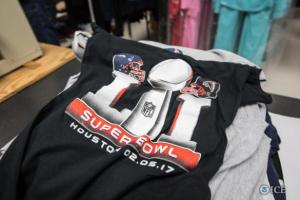Counterfeit Sports Gear Is Harder To Stop When Fans Order Directly From China Image courtesy of CBS Denver
When you’re in the market for a jersey or hat to represent your favorite team, you know that the gear being hawked out on the sidewalk near the stadium is probably not legitimate. Online, things get fuzzier, and sellers of counterfeit merchandise pop back up faster than law enforcement, trademark holders, and even the marketplace sites can knock them down.
The federal agencies that enforce this kind of thing normally like to have big, camera-friendly busts during major sports tournaments to make their point to fans and to anyone interested in selling fake sports gear, but the glory days of prosecutors posing for photos surrounded by pallets of fake jerseys may be fading.
FURTHER READING: How To Spot A Counterfeit Sports Jersey
 Rather than bulk-ship bogus goods to American resellers, the new generation of counterfeiters is dealing directly with customers.
Rather than bulk-ship bogus goods to American resellers, the new generation of counterfeiters is dealing directly with customers.
Bloomberg Technology notes that about half of the counterfeit merchandise now sold in the United States is sold directly and shipped using the regular mail or courier services, not in boxes of Tom Brady jerseys on container ships.
“Shoppers can buy things online direct from China and everything comes through the mail,” a spokesman for the National Intellectual Property Rights Coordination Center told Bloomberg. That’s the part of the Department of Homeland Security that is supposed to catch counterfeiters.
 The government did scoop up $20 million worth of fake sports merchandise, including items for this year’s Super Bowl.
The government did scoop up $20 million worth of fake sports merchandise, including items for this year’s Super Bowl.
“Operation Team Player ended with the arrest of 56 people, 50 of whom were convicted, and Immigration and Customs Enforcement naturally shared this news today, just in time for the Super Bowl.
Operation Team Player scoured retail stores, flea markets, and street vendors, though. The market is changing, and what the government really wants is more information about the counterfeiters that operate online, and only the sales platforms can provide that.
eBay and Amazon are not eager to share information about their enforcement actions and the postal and IP addresses of sellers that have been caught selling fakes, but instead tout their own counterfeit-spotting systems and zero-tolerance policies.
Alibaba, meanwhile, has been sharing more information with the U.S. government, perhaps hoping to be taken off a different agency’s counterfeit goods naughty list.
Want more consumer news? Visit our parent organization, Consumer Reports, for the latest on scams, recalls, and other consumer issues.

